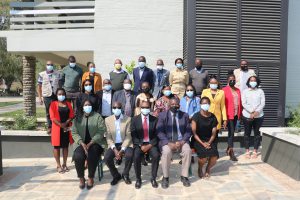Story by Rafael Hangula

Staff members from Parliament pictured with EPDN Programme Coordinator, Dr Anthony Tsekpo (second from left).
Midgard, Okahandja – On Monday (06 September 2021), the Secretariat from both Houses of Parliament, the National Assembly and National Council, started a weeklong training on their role in making parliamentary oversight effective.
Staff attending this workshop drawn from different directorates, are being acquainted on key issues related to parliamentary oversight such as its purpose, requirements for effective legislative oversight, indicators for measuring effectiveness of the legislative oversight, tools and techniques for effective legislative oversight of budgets bills and proposals, amongst others.
Parliamentary oversight deals with holding the executive accountable and ensuring that it implements policies in accordance with the laws and budget passed by Parliament. Parliamentary oversight is a constitutional mandate and function of Parliament.
It encompasses a range of activities of parliamentary committees, business in plenary sittings, as well as hearings during the parliamentary stage of bills and the budgetary cycle. Other key roles involve detecting and preventing abuse, arbitrary behaviour, or illegal and unconstitutional conduct on the part of the government and public agencies.
It also holds the government to account in respect of how the taxpayers’ money is used by detecting waste within the machinery of government and public agencies and promoting efficiency, economy and effectiveness of government operations.
This parliamentary function also ensures that policies announced by the Government and authorized by Parliament are delivered, as well as improving the transparency of government operations and enhance public trust in the government, which is a condition of effective policy delivery.
In his welcoming remarks, the Deputy Secretary at the National Council, Efraim Jane said that Parliamentary oversight is a very significant component of Government’s drive to ensure accountability.
He emphasised that there is expanded scope of state activities including rapidly increasing bureaucracy which requires parliaments to be more active in their systematic review and supervision of Executive actions to ensure transparency and accountability.
“There is no denying that our Parliament needs to do more to safeguard the resources of our Country. The supervision of government and tools for review of government activities to ensure they are done according to plan and according to law requires a significant amount of resources to accomplish,” said Jane.
“As agents and administrators of Parliament, we must understand and acquaint ourselves with the terrain and work on mobilising the required resources to support our principals to deliver on this critical component of their constitutional mandate,” he added.
It is our responsibility as Secretariat to assist Members of Parliament in the performance of the oversight function and to ensure that Government’s implementation activities are not obstructed due to poorly managed or unstructured oversight activities.
The workshop which is taking place at Midgard on the outskirts of Okahandja, is made possible by the Enhancing Participatory Democracy in Namibia (EPDN) Programme funded by the European Union (EU) and the Government of the Republic of Namibia.
EPDN Programme coordinator, Dr Anthony Tsekpo said that EPDN is a partnership programme between the Government of the Republic of Namibia and the EU, which aims to enhance engagement between the Parliament, Government bodies and Civil Society Organisations in Namibia, in the implementation of oversight of public policy and programmes particularly in the sectors of education and skills and rural development.
“EPDN has been tasked with three result areas, of which one area has to do with parliament, whereby we are expected to collaborate with Civil Society Organisations to increase the capacity of parliament to enhance the effectiveness of the oversight of public policies and programmes,” said Dr Tsekpo.
“As EPDN programme, we came to parliament with the basic objective of enhancing oversight, hence this workshop, which is looking at strengthening oversight capacity,” he added.
Training sessions are offered by various experts with extensive experience in Parliamentary affairs. The training ends on Friday (10/09/2021).





